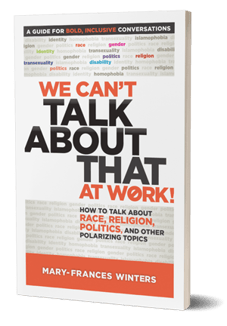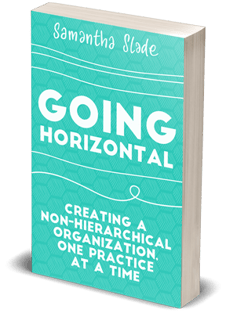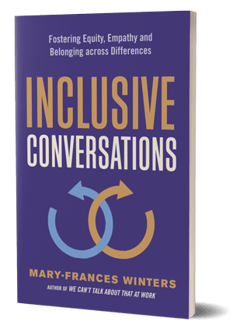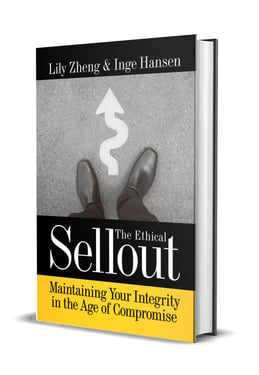Are you hoping for a workplace culture that has room for your uncensored and authentic self, swear words and all? Or are you someone who feels like they’re in a hostile work environment when they hear cursing? Whichever of these people you are, your feelings have validity.
I have been on both sides of this dilemma. I remember feeling hurt and dismayed when an executive casually used "bitching," as a synonym for complaining. I had only heard the word "bitch," in situations where people were trying to make me feel embarrassed for having an opinion while female. Even such a casual and innocuous use of the word brought up bad memories for me.
Seeking to be justified in my feelings, I posted on Facebook asking other people how they were impacted by the word "bitch." I found, to my surprise, that there was a wide range of feelings about the word. A publicist friend frequently pitched the books of feminist authors to Bitch Magazine, a well-respected feminist publication.
However, what surprised me most was finding how many women in my circle of friends (especially those in the medical profession) took pride in being called a bitch! To them, the word was a way to compliment how tough they were in a high-pressure environment. I would have never imagined or expected this! (Of course, there were also others who were as dismayed as I was by hearing the word.)
That means if you're the person setting workplace policy around this issue, your task is not simple: you have to do more than categorize which words are and aren't okay. You have to build a culture that can respond to feedback about sensitivities and needs with integrity! Words will always mean different things to different people. Your organization has to be agile enough to pivot and respond to the changing ways that language affects people.
It's important to remember, many dimensions of diversity influence how someone may respond to swearing at work. A person's comfort level with cursing depends not just on their personality but also their cultural background and trauma history. Studies also show swearing varies by generation! Each of these factors is discussed in detail below.
Cultural Diversity Means Unpredictable Reactions to Language
Many people get their beliefs about the acceptability of swearing from their childhood religious background. In the United States, where Christians represent 65% of the adult population, culturally Christian norms often predominate in the workplace, even when employers practice inclusion towards all faiths. As a result, the word "bullshit" is often treated much more casually than expressions like, "God damn it" or "to hell with it." In your workplace, are religious, scatological, and sexual profanity on the same footing? These different forms of profanity may hit differently.
 One of our most eventful and memorable internal discussions at Berrett-Koehler was about whether the word "sucks" should be used as a book title and whether it was offensive to LGBT+ rights and dignity. The whole discussion hit me by surprise. I had always considered "suck" to be a very mild swear meaning "weak and ineffectual," similar to "having no teeth." In fact, the word "suck" is a toxically homophobic swear referring to oral sex between gay men and was invented and used in the context of violence towards gay men.
One of our most eventful and memorable internal discussions at Berrett-Koehler was about whether the word "sucks" should be used as a book title and whether it was offensive to LGBT+ rights and dignity. The whole discussion hit me by surprise. I had always considered "suck" to be a very mild swear meaning "weak and ineffectual," similar to "having no teeth." In fact, the word "suck" is a toxically homophobic swear referring to oral sex between gay men and was invented and used in the context of violence towards gay men.
Few people who use this swear understand its violent history, however. The author was mirroring the language of her target consumer. She consulted with entrepreneurs in industries where profanity was often seen as an indicator of honesty and sincerity. Using the word "sucks" got across the emotional urgency in a way that connected with the particular audience. We could use our creativity to communicate the emotional urgency in other ways and come up with an alternate book title that everyone loved. However, a comprehensive and rigorously enforced policy about swearing in books wasn't what caused the outcome. A culture in which staff members felt empowered to raise concerns was vital.
When constructing language norms in your workplace, everyone's input has to be valued, or your workplace norms will reflect the comfort and preferences of the most influential people in your workplace. Having systems for proactively seeking feedback and inviting people to speak up can work much better than expecting employees to bring their concerns to you. It’s hard to raise a sticky issue unless there is abundant proof from management that your voice will be valued. Our book We Can’t Talk About This At Work! is a guide for fostering a culture that can handle those tough conversations.
How Trauma History May Influence Reaction to Swearing
 I grew up believing many words were normal and have been determined in the past decade to have harmful impacts. Saying "that's a lame idea" is now considered ableist and disparaging to people who need wheelchairs or crutches. The AP Stylebook, a go-to resource for many journalism outlets and publishers, says not to use crazy or nuts as a negative description because that is disparaging to those with mental health conditions.
I grew up believing many words were normal and have been determined in the past decade to have harmful impacts. Saying "that's a lame idea" is now considered ableist and disparaging to people who need wheelchairs or crutches. The AP Stylebook, a go-to resource for many journalism outlets and publishers, says not to use crazy or nuts as a negative description because that is disparaging to those with mental health conditions.
When you make language mistakes (as I have often done), it's easy to feel that the people complaining about your language are being particular or fussy. When I say, "I love that crazy hairstyle," am I really contributing to ableism against the mentally ill? I feel tempted to roll my eyes or complain that since I've had depression, I should get to use the word "crazy," as much as I want.
What a word means to me is not always what a word means to another person. What for me is a casual comment may be a subtle act of exclusion for another person. We never stop being surprised at how we are misunderstood by other people (and misunderstand other people). As a professional book editor, one of the hardest parts of my job is researching and anticipating how different words will hit different audiences, especially given how language is always evolving and changing.
No vulgarity policy can substitute the hard work of building a high-trust culture where feedback is acted upon and valued. Our book, The Idea-Driven Organization, addresses the infrastructure an organization must build to consistently act on employee feedback. Our book Going Horizontal discusses ways to dismantle power inequality in the workplace. Inclusive Conversations covers how you can structure discussions on tough topics like racism, sexism, and homophobia. All of these are different and complementary approaches to building a responsive and caring culture.
Generational Differences in Swearing
 Millennials are far more willing than Baby Boomers to curse in the workplace, studies show. Studies also show that millennials value emotional intelligence and believe emotions have a place in the workplace, whereas older generations might have been taught that concealing emotion in the workplace is more appropriate. Cursing generally conveys a strong feeling.
Millennials are far more willing than Baby Boomers to curse in the workplace, studies show. Studies also show that millennials value emotional intelligence and believe emotions have a place in the workplace, whereas older generations might have been taught that concealing emotion in the workplace is more appropriate. Cursing generally conveys a strong feeling.
The popularity of leadership speakers like Brené Brown show the sea-change taking place in the norms of professionalism. It's gone from "leave home at home" to "be your vulnerable and authentic self at work." The important thing is not to ignore power dynamics. Who gets to be vulnerable and authentic without stigma or consequences? It has a lot to do with power.
We recently held a training session: “Call In or Call out?” as part of our Self to Systems series on diversity, equity, and inclusion in the workplace. During the training, diversity expert and author of The Ethical Sellout, Lily Zheng said, “When you have trust & influence, calling in is an effective tactic… When you don't have that, what else are you going to do but go to social media & roast the hell out of the company?”
Lily's insight brilliantly addresses the intersection between civility norms and power dynamics. When you "call someone in," after they make a mistake, you're usually using language that is very gentle and civil, which will only work if they trust you. When you "call someone out" for making a mistake, you may be using harsh or critical language: in some situations, even cursing. The call-in's perceived appropriateness or the call-out may be very influenced by someone's position in a power structure.
Lily used some swear words throughout the training. Many of our viewers posted excited or supportive comments in chat whenever Lily swore because they cared passionately about injustice in the workplace. Lily's cursing expressed the passion they felt about the cause. However, we also had a few readers write that the cursing made them feel uncomfortable and out of place at the training.
I noticed that Lily only swore when they were referencing powerful people who made choices to harm others. In the social justice field, "tone policing" is criticized for asking victims and advocates to moderate their tone when discussing acts of violence. Why would harsh words be considered more disgusting than real-life tragedies, activists ask? Isn’t strong emotion an appropriate response to tragedy and injustice? Harsh words should not be considered more disgusting than real-life tragedies - a strong emotion to these tragedies is an appropriate response!
Is the Swearing Safe or Unsafe?
This research published in the Leadership & Organization Development journal found that cursing, "when used in a non-abusive manner… can enable the development of personal relationships among coworkers." The key caveat here is, "when used in a non-abusive manner." One of the search term keywords Google considers most related to "swearing at work" is "criteria for a hostile work environment." This data suggests that many people who are Googling profanity in the workplace also have concerns about abuse in the workplace.
If an abusive supervisor is prevented from swearing, does that mean that they will stop abusing their employee, though? Unless you fix the underlying cultural problems that enable abuse of power, an anti-swearing policy functions at a very superficial level. It will remove whatever stress is directly related to the curse words themselves, but it won't resolve the underlying relationship stress.
Informality between teammates can be a sign of high-trust teams. In some cultural contexts but not others, swearing can signal, "I trust you enough to be informal with you." The confusing thing for the responsible manager or HR worker is that high-trust teams and abusive low-trust teams may be using the same words!
Understanding the relationships and power dynamics at play may take some legwork, but they're part of keeping a workplace healthy and legally compliant. Is a woman laughing at a coworker's sexually vulgar joke when she actually feels threatened and uncomfortable? That's way out of line! Your company could be opening itself up to a sexual harassment lawsuit in the future.
Is your chief financial officer upset that their visiting investor might hear the programmers cheerfully swearing at the bugs in their code? What if this rare and valuable programming talent decides to leave for a workplace where the vulgarity of their creative process can be more respected?
Although both these situations are tense, they say very different things about your cultural problems and solutions. As a result, different types of HR and manager intervention would be optimal to handle each situation.
Our best-selling employee retention book, Love ‘Em or Lose ‘Em by Beverley Kaye has a chapter for each letter of the alphabet. The letter "J," is for: "Jerk: Don't Be One." When the book was originally published, our staff debated the risk of saying, “jerk,” wondering whether the reader would find this chapter insulting.
Instead, the readers respected the passion and forcefulness of the language. It struck home with many managers who worried about being perceived as jerks. "Jerk: Don't Be One," got lots of positive feedback and even became a requested speaking topic for the authors! The authors were not jerks when they used the word jerk!
The Willingness to Adapt to Others
 Once, a very dear friend asked me to stop swearing. I assumed she was tone policing me, and I felt resentment towards her. She sensed my resentment and explained that her alcoholic father would swear at her when she was a child. Curse words brought back incredibly painful memories for her. Horrified, I made an effort to stop the cursing.
Once, a very dear friend asked me to stop swearing. I assumed she was tone policing me, and I felt resentment towards her. She sensed my resentment and explained that her alcoholic father would swear at her when she was a child. Curse words brought back incredibly painful memories for her. Horrified, I made an effort to stop the cursing.
After a few weeks, she asked me to bring the cursing back. She said even though the words themselves hurt, she loved hearing how I sounded when I felt full freedom to be myself. The mutual willingness to adapt to each other (rather than stay trapped in rigid positions) built and strengthened our friendship. I still try not to swear around her, but I no longer feel awkward or embarrassed if something slips through. Affirming the importance of each other’s needs was what ended up being important.
There is no person on earth who cannot be hurt by words. What harmful words are socially normalized and approved, and what harmful words are taboo and stigmatized, varies by culture, is in a state of constant change, and rarely considers everyone's needs. There is usually an inherent tension between authenticity and acceptability. One thing I especially enjoyed about Lily Zheng's book, The Ethical Sellout, was how it covered the nuances of that tension.
Willingness to direct needless vulgarity at less powerful people signifies that something is badly wrong with culture. The willingness to curse out harmful actions of powerful people, on the other hand, can often be a last-choice method for addressing serious unmet needs and problems. It is certainly true that the ability to curse out companies on social media gave executives unprecedented motivation to improve their policies and actions.
“Who are you swearing at?” will almost always be a more relevant question than, “What was the curse word?”




